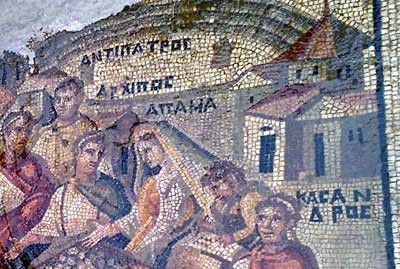Syria’s rich and deep-rooted history and cultural heritage have been exposed to acts of vandalism, looting and illicit trafficking by foreign-backed armed terrorist groups since the beginning of the crisis in Syria. The archeological city of Apamea bears witness to the terrorists’ barbarism and criminality.
Apamea, the worldwide famous archeological site, is one of Syria’s most spectacular national treasures. Some called it “The Sun of Cities” due to its bright history, gorgeous archeological features and the glorious stories of its great heroes who had achieved legendary achievements there.
“The Sun of Cities” was the destination of hundreds of archeologists and researchers who were interested in deep-rooted human history.
Apamea, 60 km far from the north west of Hama province, was founded in 300 BC and it was one of the four main Syrian cities which kept the only gate of the Saluki Empire to the sea.
 Apamea’s situation, like other Syrian archeological sites, has been deteriorated due to the acts of theft and looting by armed groups. The attacks were supported by enemies of humanity and civilization to prove their anti-civilization mindset.
Apamea’s situation, like other Syrian archeological sites, has been deteriorated due to the acts of theft and looting by armed groups. The attacks were supported by enemies of humanity and civilization to prove their anti-civilization mindset.
Chairman of Hama Antiquities Directorate, Abdulqader Farzat said that the foreign- backed terrorist groups and mercenaries have exterminated Apamea’s history and its Syrian cultural identity. They illegally ransacked hundreds of sites in the city unqualmed by any human or moral restraint.
Ferzat added that the terrorists have infiltrated into Apamea and pillaged silver, golden and mosaic artifacts.
He clarified that the gangs blatantly carried out illegal excavations using up-to-date techniques and heavy machines, pointing out that these gangs shoveled important historical sites in Apamea city.
Ferzat reiterated that the Turkish government is involved in the crimes which heavily and systematically targeted the Syrian cultural heritage.
He pointed out that when the Syrian army forces bashed the terrorists groups and mercenaries’ hideouts, they found mosaic panels, statues, archeological rock heads and twenty valuable objects which had been prepared to be smuggled and absconded outside Syria.
Ferzat made it clear that the aforementioned antiquities were restituted and handed over to Hama Directorate of Antiquities.
 Apamea Museum, which is considered as one of the most important mosaic museums all over the world, was also exposed to pillaging as terrorists groups stole a marble statue of a man’s torso and a round stone panel representing the Sun goddess, according to Ferzat.
Apamea Museum, which is considered as one of the most important mosaic museums all over the world, was also exposed to pillaging as terrorists groups stole a marble statue of a man’s torso and a round stone panel representing the Sun goddess, according to Ferzat.
He stressed that more than 75 Apamea archeological sites were exposed to illegal and random excavation and a number of its important features were subject to acts of barbarism, destruction and looting committed by armed terrorist groups.
He stressed that Hama Antiquities Directorate has spared no effort to save as much as possible the archeological pieces and treasures in Apamea and to guard them against acts of theft and looting.
Ferzat called upon the local society and all concerned bodies in the region to shoulder their responsibility concerning the protection of the Syrian archeological sites and museums which are considered as part of the cultural heritage of humanity.
It is noteworthy to mention that among the most important archeological features of Apamea is the 7km long fence which contains 100 towers, the triumph arch built after the earthquake of 115 AD and renovated in the 6th century, mosaic panels, a cathedral as well as the Roman-type theatre which is considered as one of the largest ancient world theatres. The 1850m long and 37.5m wide Street of Columns which goes through the city from the northern gate to the southern one was also among the city’s attractions. It goes back to the Hellenistic era.
There is no doubt that whatever crimes the foreign- backed terrorist groups and mercenaries commit against the Syrian antiquities, Syria will stay steadfast thanks to the cooperation of its locals who are keen to preserve Syria’s cultural heritage and curb the illicit trafficking against their cultural properties.
Rawaa Ghanam

